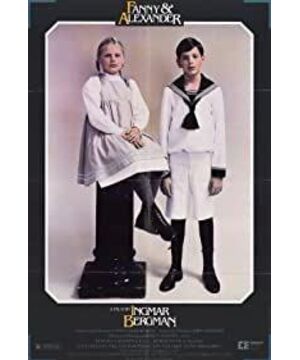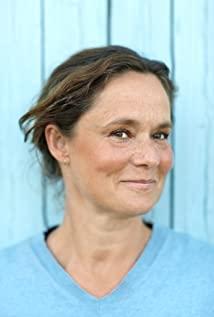"Fanny and Alexander" is the last film Ingmar Bergman claimed to have since directed in 1945. It is his most expensive and longest film, and he won the fourth Oscar for this. Although it is not an easy task to summarize such an artist, and it seems still too early, we can still regard this film as Bergman's reproduction and summary of his life's screen work.
"Fanny and Alexander" is an autobiographical film with characteristics of childhood chronicles. The Alexander in the film is Bergman himself, and the town where the film takes place is obviously his birthplace, Uppsala, Sweden. His grandmother had a big house, and his grandmother loved him extremely. For Bergman, his childhood joy was spent with his grandmother. In many of Bergman’s films, such as "Wolf's Moment" and "Face to Face", you can see the shadow of his childhood life, while "Fanny and Alexander" is the pain and joy of Bergman's childhood life. The most true portrayal. It can be said that his childhood life experience has had an indelible impact on his artistic creation throughout his life.
Religious issues have always plagued Bergman, and even become a subject of concern and discussion in his works. Bergman once said: "Religious issues are always with me." This influence stems from his religious family. His father, Enrique Bergman, is a priest, rude and authoritarian, and extremely strict with his children. Bergman grew up in a repressive religious atmosphere, which established Bergman's dissatisfaction with religion. From the perspective of Bergman’s films, he has a process from doubt to denial of "God". He is famous in "The Seventh Seal", "Wild Strawberry", "Still in the Mirror" and "Winter Light". His doubts about God are repeatedly shown in the film. In "Fanny and Alexander", this suspicion develops into a clear denial and criticism. The first appearance of Bishop Virgilos, the representative of God, in the film caused Alexander's disgust. The film described him as a "good-looking woman seducing expert". He appeared with a fair, kind, and loving face, but he was actually a Selfish and abominable villain. His heart was full of jealousy and hatred, so that he and Alexander, who was only 10 years old, became antagonistic enemies. Bergman called the bishop "the god of piss" through Alexander's mouth, and used Aaron's hands to shape "God" into a huge puppet with no friends and a puffy face, only to fall to the ground. In Bergman's film, God completely broke down in Bergman's heart.
Bergman's films have won many international awards, some of which are won with a novel and unique film language, such as "Wild Strawberry", and some have won the approval of the critics with the content of the film, such as "The Silence". In fact, the form of Bergman's film serves its content. Whether it uses innovative techniques or traditional expression methods, it is to show the author's profound thoughts and his views on life and the world. "Fanny and Alexander" adopts a traditional dramatic play structure.
Bergman's films are deeply influenced by literature and drama. Although Bergman himself does not admit that he is a writer, he is the screenwriter in all the films he directs. The film scripts written by Bergman resemble both stage plays and novels, possessing all the characteristics of literary works, and are extremely readable. Birgitta Engman once said, “Bergman’s screenplay provides a new perspective for observing his work with its precise language and unique literary image. Therefore, audiences who have read his script are better than those who have not read it. The audience of his script can more accurately grasp the tone and message of his work." In "Fanny and Alexandria", the tortuous plot, sharp dramatic conflict, characterization of characters, and the struggle between good and evil are more prominent. The script not only adds a prologue and an epilogue, but is also full of enlightenment. The unforgettable atmosphere is a typical "screen drama."
In Bergman's view, real life and drama cannot be separated. Everyone consciously or unconsciously plays a role in real life, and the performance on stage is just explaining life. Bergman used the screen form to merge life and drama into one, and this approach was intensively reflected in "Fanny and Alexander". At the beginning of the film, the Oscar family performed "Nativity" in the theater, Emily and the children played fairies and angels, Oscar played Joseph, and this family in life is also in such a relationship. The Akdal’s family celebrated Christmas Eve in Helena’s house, and the family headed by Helena danced through the room in a long line. This rich and joyful life scene was like acting. Just as Oscar played a ghost in "Hamlet", the relationship between Alexander and his stepfather and mother in reality is just like the relationship between the characters in "Hamlet". This kind of interweaving of reality and drama is consistent throughout "Fanny and Alexander".
Dreaming is Bergman's favorite and most frequently used technique. Bergman once said, "My films are like my dreams." In "Fanny and Alexander", Alexander saw the mysterious and unknowable world in a semi-dream and semi-realistic state. Bergman highly praised the famous Swedish writer Strindberg. Strindberg is good at using memory, experience, fantasy and absurdity in his works to express his profound thoughts, and Bergman is deeply influenced by it. A passage in the preface of Strindberg's "A Drama of Dreams": "Anything can happen, everything is possible... Time and space do not exist. On a meaningless background, imagination is weaving "The new pattern" seems to be the finishing touch to "Fanny and Alexander". Bergman used this passage to emphasize the unreality, dreaminess and unexplainable nature of life itself. In this film, from Alexander lying under the table and sticking out his head to look at the big house, to his slideshow in the nursery room, his ghost appeared many times after Oscar’s death, and the mystery of the death of the bishop’s ex-wife and daughter, Isaac magically packed Fannie and Alexander away in a big box. The many grotesque phenomena in the antique shop and Ismail's superhuman imagination all aroused the spectator's imagination. Whenever Bergman can't explain the world, he resorts to a kind of magic, so his films always have a kind of mysterious mysticism tendency.
Like all Bergman's films, "Fanny and Alexander" also contains metaphors and symbols everywhere. There is a concealed and well-decorated door between Helena and Emily’s residence, which symbolizes the difficult interpersonal relationship; the theater and the Akdal’s house symbolize a small world isolated from the outside world; Oscar’s funeral is like a Performance; the bishop symbolizes the supreme God, but his name is the same as the fascist in "Snake Egg" (1978); the "God" who talks with Alexander in the antique shop turned out to be Aron's marionette; Amy The tragedy caused by Lee leaving the theater to go to the bishop is a metaphor for Bergman's views on religion; and the closed door opened at the end of the film metaphors that people can finally communicate with each other. These symbols and metaphors play a unique role in expressing the theme of the film and revealing the psychology of the characters.
Bergman once said: "Sometimes, I have a strong idea or a sharp vision of what I want to shoot... It seems like a red line is pulled out of my belly." "Fanny and Alexander" focused on Berg. Mann’s film has exquisite artistic skills. His films are extremely sophisticated in lighting and color selection, and contrast sharply in the performance of scenes with different connotations. The Akdal’s house is based on crimson, with a warm and rich atmosphere, while the bishop’s residence is almost black and white, which makes people feel cold and depressed.
Bergman’s films benefited from Swann Nick West, who has worked with him for 30 years. This famous photographer is not only highly accomplished, but also able to accurately understand and reflect Bergman’s creative intentions and the inner meaning of his works. . In "Fanny and Alexandria", he freely and accurately uses switching to make the transition of the film from dream to reality without any pretentiousness, and achieve the perfect unity of content and form. The film is well-deserved for winning the Academy Award for Photography.
Bergman’s family environment and natural conditions such as Northern Europe’s wide and sparsely populated areas and long winters prevented him from getting rid of the loneliness, melancholy and calm and contemplative temperament and nature of the Swedes, and also made him live in the environment in which he lived. A closed world. A large number of his works, such as "Wild Strawberry", "Still in the Mirror", "Winter Light", "Silence", etc. are all focused on showing the protagonist's lonely self, as well as the misfortune of their marriage and family, they are unable to fight against the outside world. Suo lives in a small world isolated from the outside world. In Bergman's farewell film, he regards the theater and the Ekdal house as a small room full of care and love. Its warmth is relative to the suffering of the big world. Different from the previous films, the author showed light, hope and love in harmony in this film. The film continues with joy and reunion, reflecting Bergman's change in views on life.
Bergman’s films have inherited Swedish cultural traditions and film traditions, and his works are deeply influenced by Swedish silent films. Like his teachers Sjostrom and Stiller, he pursues the interaction between man and nature, and nature also plays an important dramatic role in his works. Summer has a unique intrinsic value in Bergman's films. Bright summer and wild strawberry have almost become synonymous with light and happiness. Different from his predecessors, Bergman's film focuses more on the philosophical exploration of the inner world of the lonely, lonely and melancholic and middle-class intellectuals. His works are deeper and heavier, and these characteristics of the Swedish national temperament seem to have become the mark of all Bergman's films.
View more about Fanny and Alexander reviews











